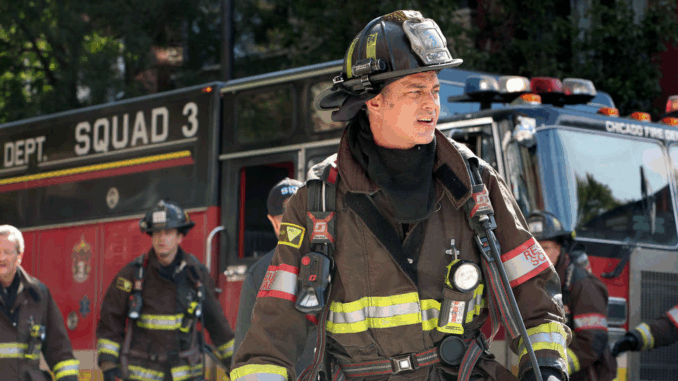
The Unseen Inferno: When a “Chicago Fire” Star Fights a Different Blaze
On the gleaming, rain-slicked sets of “Chicago Fire,” he was an archetype of unwavering strength: chiseled jawline set against the backdrop of an inferno, a steel gaze cutting through smoke and chaos, a man forged in the crucible of adrenaline and duty. To millions, he was the embodiment of the indomitable spirit of first responders, a hero whose physical prowess seemed as boundless as his courage. But off-screen, in the quiet solitude of his own life, a different, unseen blaze was raging – a personal health struggle that threatened to consume him, far from the dramatic rescues and cheering crowds.
Let’s imagine such a star, an actor we’ll call Alex Thorne, known for his stoic portrayal of Captain Miller. On screen, Miller could carry a weighted dummy through collapsing debris, sprint through burning corridors, and deliver impassioned monologues, all with an air of unyielding resilience. The cameras loved his powerful physique, his seemingly endless stamina. Yet, when the director yelled “Cut!” and the cameras ceased their hungry gaze, Alex would often retreat, the forced smile fading, replaced by a ghost of fatigue in his eyes. For years, he had been privately battling a chronic autoimmune condition, a relentless, shapeless adversary that preyed on his energy, his joints, his very will.
The irony was brutal. While Captain Miller faced visible, tangible fires that could be fought with hoses and axes, Alex’s personal inferno was internal, insidious, and largely invisible. The aches that gnawed at his bones, the waves of debilitating fatigue that could strike without warning, the mental fog that made memorizing lines a Herculean task – these were the daily battles no stunt coordinator could choreograph, no script could prepare him for. He’d learned to camouflage his pain, to push through the throbbing temples and the joint stiffness, relying on sheer force of will and the expert hands of makeup artists who, without knowing it, were concealing more than just late-night shoots. Every forced laugh during an interview, every seemingly effortless jog across a set, was a silent testament to a Herculean effort, a performance within a performance.
The public image, the hero persona, became both a shield and a cage. It was a shield against the probing questions, a way to maintain the illusion of control and perfection that celebrity often demands. But it was also a cage, trapping him in a lonely silence, afraid that admitting weakness would shatter the very edifice he had so carefully constructed. How could Captain Miller, the epitome of strength, admit to needing a nap after a simple walk, or to struggling with the pain of gripping a steering wheel? The fear of being perceived as “less than,” of letting down his fans, of jeopardizing his career, was a heavy, invisible cloak he wore over his ailing body.
But silence, as many who suffer in secret discover, can be more corrosive than revelation. The isolation began to weigh heavier than the illness itself. The constant vigilance, the lies of omission, the quiet despair of fighting alone – it all began to take its toll. There came a breaking point, perhaps a particularly debilitating flare-up, or a moment of profound vulnerability with a trusted friend, that finally pushed Alex to consider something radical: opening up.
The decision wasn’t made lightly. It was fraught with anxiety about public perception, career repercussions, and the daunting prospect of exposing his deepest vulnerability. Yet, the moment he finally spoke – perhaps in a thoughtful interview, or a heartfelt social media post – something shifted. It wasn’t a roar of triumph, but a quiet, trembling confession. He spoke not of his character’s heroics, but of his own human frailty; not of battling flames, but of battling an unseen opponent within; not of saving lives, but of struggling to live his own.
The response was, for Alex, its own kind of miracle. Instead of scorn or pity, there was an outpouring of empathy, understanding, and shared experience. Fellow sufferers, who had also worn their own masks, found a beacon in his honesty. Fans, who had admired his on-screen strength, now respected his off-screen courage even more. The uniform of Captain Miller, once a symbol of his public persona, now seemed to represent a different kind of strength: the strength to be authentically human, flaws and all.
Alex Thorne’s story, though fictionalized, illustrates a profound truth about the human condition, especially for those in the public eye. Heroism isn’t always about grand gestures and dramatic rescues; sometimes, it’s about the quiet fortitude required to face personal demons, to exist authentically, and to choose vulnerability over the suffocating weight of silence. By opening up about his personal health struggles, the “Chicago Fire” star didn’t diminish his heroic image; he redefined it. He showed us that true strength isn’t the absence of struggle, but the courage to acknowledge it, to live with it, and perhaps most importantly, to share it, lighting a different kind of fire – one of connection, empathy, and shared humanity, far brighter and more enduring than any on-screen blaze.